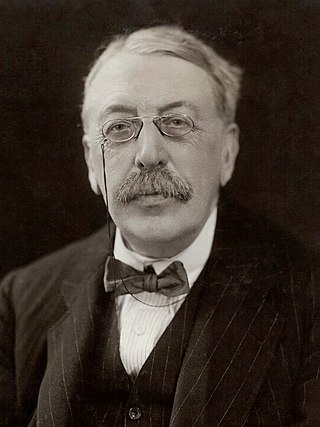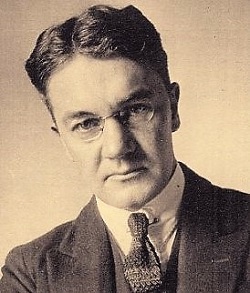
Sir Edward William Elgar, 1st Baronet, was an English composer, many of whose works have entered the British and international classical concert repertoire. Among his best-known compositions are orchestral works including the Enigma Variations, the Pomp and Circumstance Marches, concertos for violin and cello, and two symphonies. He also composed choral works, including The Dream of Gerontius, chamber music and songs. He was appointed Master of the King's Musick in 1924.

Sir Charles Villiers Stanford was an Anglo-Irish composer, music teacher, and conductor of the late Romantic era. Born to a well-off and highly musical family in Dublin, Stanford was educated at the University of Cambridge before studying music in Leipzig and Berlin. He was instrumental in raising the status of the Cambridge University Musical Society, attracting international stars to perform with it.

Sir Granville Ransome Bantock was a British composer of classical music.

Ernest Newman was an English music critic and musicologist. Grove's Dictionary of Music and Musicians describes him as "the most celebrated British music critic in the first half of the 20th century." His style of criticism, aiming at intellectual objectivity in contrast to the more subjective approach of other critics, such as Neville Cardus, was reflected in his books on Richard Wagner, Hugo Wolf, Richard Strauss and others. He was music critic of The Sunday Times from 1920 until his death nearly forty years later. His other positions included chief music critic of The Birmingham Post from 1906 to 1919, as well as brief stints as the chief music critic for The Guardian (1905–1906) and The Observer (1919).

Frederic William Austin was an English baritone singer, a musical teacher and composer in the period 1905–30. He is perhaps best remembered for his arrangement of Johann Pepusch's music for a 1920 production of The Beggar's Opera by John Gay, and its sequel Polly in 1922; and for his popularization of the melody of the carol The Twelve Days of Christmas. Austin was the older brother of the composer Ernest Austin (1874–1947).

Julius Allan Greenway Harrison was an English composer and conductor who was particularly known for his interpretation of operatic works. Born in Lower Mitton, Stourport in Worcestershire, by the age of 16 he was already an established musician. His career included a directorship of opera at the Royal Academy of Music where he was a professor of composition, a position as répétiteur at the Royal Opera House, Covent Garden, conductor for the British National Opera Company, military service as an officer in the Royal Flying Corps, and founder member and vice-president of the Elgar Society.
Edwin Evans was an English music critic.

St Alban the Martyr, Birmingham is a Grade II* listed Church of England parish church in the Anglican Diocese of Birmingham. It is dedicated to Saint Alban, the first British Christian martyr.
This is a summary of 1920 in music in the United Kingdom.
This is a summary of 1914 in music in the United Kingdom.
Alfred Edward Rodewald was an English musician, but a merchant by profession. He developed the Liverpool Orchestral Society to become a large semi-professional orchestra of distinction. He was a close friend of the English composer, Edward Elgar and the Austro-Hungarian conductor Hans Richter.
This is a summary of 1912 in music in the United Kingdom.
This is a summary of 1905 in music in the United Kingdom.
Stephen David Banfield is a musicologist, music historian and retired academic. He was Elgar Professor of Music at the University of Birmingham from 1992 to 2003, and then Stanley Hugh Badock Professor of Music at the University of Bristol from 2003 to his retirement at the end of 2012; he has since been an emeritus professor at Bristol.
John David Davis, often known as J D Davis, was an English composer, born in Edgbaston, near Birmingham.
Christopher Montague Edmunds was an English composer, academic and organist who lived and worked in Birmingham.








